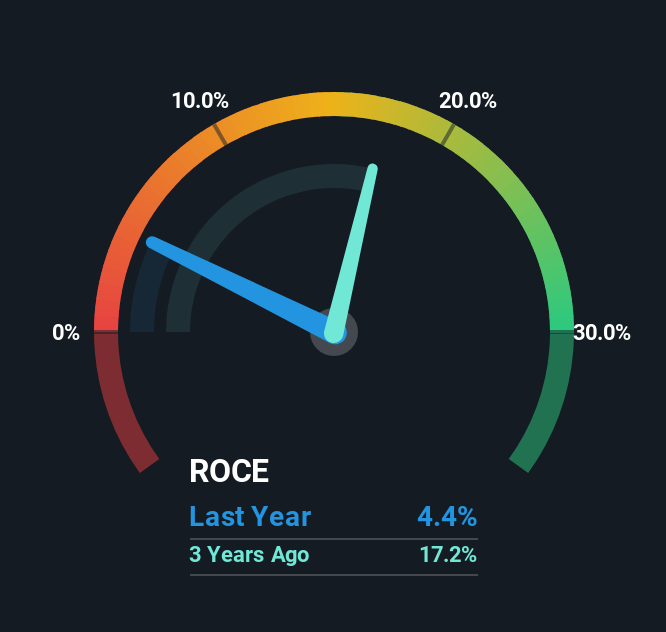- Israel
- /
- Aerospace & Defense
- /
- TASE:ISHI
Israel Shipyards Industries' (TLV:ISHI) Returns On Capital Not Reflecting Well On The Business
What are the early trends we should look for to identify a stock that could multiply in value over the long term? In a perfect world, we'd like to see a company investing more capital into its business and ideally the returns earned from that capital are also increasing. If you see this, it typically means it's a company with a great business model and plenty of profitable reinvestment opportunities. In light of that, when we looked at Israel Shipyards Industries (TLV:ISHI) and its ROCE trend, we weren't exactly thrilled.
Understanding Return On Capital Employed (ROCE)
For those who don't know, ROCE is a measure of a company's yearly pre-tax profit (its return), relative to the capital employed in the business. To calculate this metric for Israel Shipyards Industries, this is the formula:
Return on Capital Employed = Earnings Before Interest and Tax (EBIT) ÷ (Total Assets - Current Liabilities)
0.044 = ₪53m ÷ (₪2.2b - ₪946m) (Based on the trailing twelve months to June 2025).
Therefore, Israel Shipyards Industries has an ROCE of 4.4%. Ultimately, that's a low return and it under-performs the Aerospace & Defense industry average of 22%.
See our latest analysis for Israel Shipyards Industries

While the past is not representative of the future, it can be helpful to know how a company has performed historically, which is why we have this chart above. If you'd like to look at how Israel Shipyards Industries has performed in the past in other metrics, you can view this free graph of Israel Shipyards Industries' past earnings, revenue and cash flow.
So How Is Israel Shipyards Industries' ROCE Trending?
In terms of Israel Shipyards Industries' historical ROCE movements, the trend isn't fantastic. Over the last five years, returns on capital have decreased to 4.4% from 15% five years ago. However, given capital employed and revenue have both increased it appears that the business is currently pursuing growth, at the consequence of short term returns. If these investments prove successful, this can bode very well for long term stock performance.
On a separate but related note, it's important to know that Israel Shipyards Industries has a current liabilities to total assets ratio of 44%, which we'd consider pretty high. This effectively means that suppliers (or short-term creditors) are funding a large portion of the business, so just be aware that this can introduce some elements of risk. While it's not necessarily a bad thing, it can be beneficial if this ratio is lower.
What We Can Learn From Israel Shipyards Industries' ROCE
Even though returns on capital have fallen in the short term, we find it promising that revenue and capital employed have both increased for Israel Shipyards Industries. And the stock has followed suit returning a meaningful 87% to shareholders over the last five years. So while investors seem to be recognizing these promising trends, we would look further into this stock to make sure the other metrics justify the positive view.
Israel Shipyards Industries does have some risks, we noticed 4 warning signs (and 1 which doesn't sit too well with us) we think you should know about.
While Israel Shipyards Industries isn't earning the highest return, check out this free list of companies that are earning high returns on equity with solid balance sheets.
New: AI Stock Screener & Alerts
Our new AI Stock Screener scans the market every day to uncover opportunities.
• Dividend Powerhouses (3%+ Yield)
• Undervalued Small Caps with Insider Buying
• High growth Tech and AI Companies
Or build your own from over 50 metrics.
Have feedback on this article? Concerned about the content? Get in touch with us directly. Alternatively, email editorial-team (at) simplywallst.com.
This article by Simply Wall St is general in nature. We provide commentary based on historical data and analyst forecasts only using an unbiased methodology and our articles are not intended to be financial advice. It does not constitute a recommendation to buy or sell any stock, and does not take account of your objectives, or your financial situation. We aim to bring you long-term focused analysis driven by fundamental data. Note that our analysis may not factor in the latest price-sensitive company announcements or qualitative material. Simply Wall St has no position in any stocks mentioned.
About TASE:ISHI
Israel Shipyards Industries
Designs, constructs, markets, and sells military and civilian vessels in Israel and internationally.
Excellent balance sheet with slight risk.
Market Insights
Community Narratives



